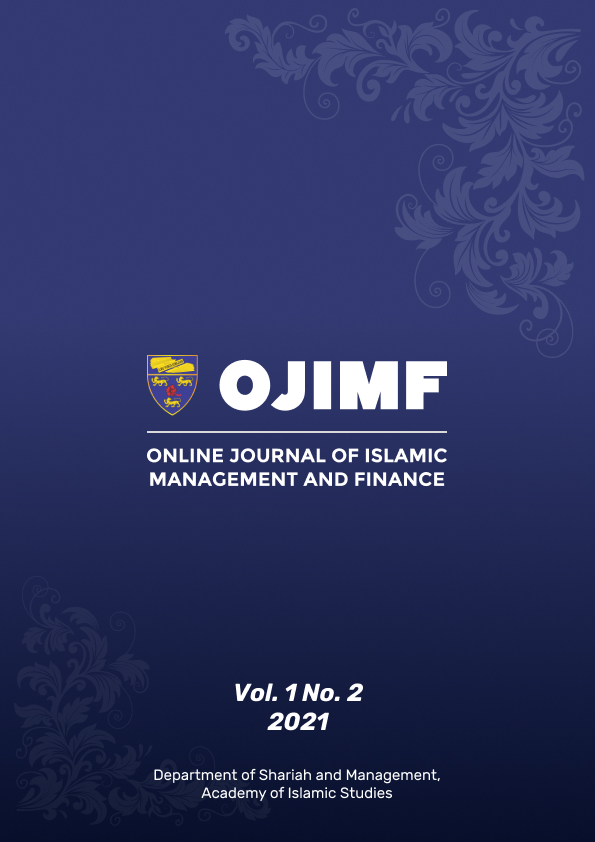THE DEVASTATED NATURE OF INTEREST BASED DEBT FOR DEVELOPMENT, HUMANITY AND COUNTRIES
Main Article Content
Abstract
Interest based debt acquired by countries for their developmental concerns through foreign funding agencies has harmed the residents of those nations. Humans are considered as commodity for the ones having power and affluence thus, having greatest concentration of wealth which is accumulated through distribution of interest-based debts. The study is conducted to analyze the devastated effect of interest-based debt obtained for developmental concerns upon humanity and countries particularly Pakistan. The question arises to what extent interest-based debt acquired for developmental purposes affected Country’s sovereignty. This study applies Qualitative research methodology in pursual of building a conceptual framework by incorporating inductive paradigm. Interest based debt acts as a curse for nation’s economic-social prosperity, political stability, and spiritual values. The study suggests that interest-based debt as phenomena helps in accumulation of national and global wealth in fewer hands. It is in the best interest of the world to be aware of corporate greed and self-interest strategies in the veil of distributing interest-based loans for developmental concerns which is a debt trap and can be avoided by enforcing interest free economic policies in their respective territories to promote socio-economic wellbeing of the masses generally and particularly in Pakistan.
Downloads
Article Details
References
Aqib Ali, M. (2015). The Roots and Development of Islamic Banking in the World and Pakistan. South Asia Journal of Contemporary Business, Economics and Law, 7(1), 58-63.
Ayub, M. (2013). Understanding Islamic Finance: Gramedia Pustaka Utama: Jakarta.
Baloch, F. (2019). Every Pakistani to pay Rs127,000 as national debt rises 21% in a year. Retrieved from https://www.samaa.tv/news/2019/01/every-pakistani-to-pay-rs127000-as-national-debt-rises-21-in-a-year/
Chibber, K. (2014). In 2014, countries are still paying off debt from World War One. Retrieved from https://qz.com/290183/in-2014-countries-are-still-paying-off-debt-from-world-war-one/
Council, S. (2021). Senseless Cycle of Bloodshed, Destruction between Israel, Palestinians in Gaza Must Stop Now, Secretary-General Tells Security Council [Press release]. Retrieved from https://www.un.org/press/en/2021/sc14521.doc.htm
Eby, B. (2016). The Economics of Human Trafficking. Retrieved from https://tifwe.org/the-economics-of-human-trafficking/
Elmer, K. (2019). China says multinational lenders are to blame for debts of belt and road partners like Pakistan. Retrieved from https://www.scmp.com/news/china/diplomacy/article/2189336/china-says-multinational-lenders-are-blame-debts-belt-and-road
Ghutai, G., & Bahari, Z. (2019). Zero Interest Rate: From The Perspective Of Islamic Tasawur And Epistemology. International Journal of Accounting, 4(22), 1-9.
Ghutai, G., & Bahari, Z. (2020). The Slogan Of Making Pakistan Alike First Islamic State Of Madina: Aspiration, Commitment And Reality. Journal of Islamic Social, Economics and Development, 5(29), 51-62.
Gibbs, A. (2015). Who still owes what for the two World Wars. https://www.cnbc.com/2015/03/18/who-still-owes-what-for-the-two-world-wars.html
Hafezi, P. (2010). Sanctions widen gap between Iranian poor and rich. Reuters. Lifestyle. 27 October https://www.reuters.com/article/us-iran-economy-idUSTRE69Q3BJ20101027
Haney, L. H. (1911). History of Economic Thought: A Critical Account Of The Origin And Development Of The Economic Theories Of The Leading Thinkers In The Leading Nations: Macmillan: California.
Hart, K. (2000). The Memory Bank: Money In An Unequal World: Profile Books: London.
Hassan R. (2019). Political and Social Changes in the Muslim World with Special Reference to Development, Knowledge and Freedom Deficits. In: Mansouri F., Keskin Z. (eds) Contesting the Theological Foundations of Islamism and Violent Extremism. Middle East Today. Palgrave Macmillan, Cham. https://doi.org/10.1007/978-3-030-02719-3_6
Hinton, J., & Maclurcan, D. (2019). How on Earth: Flourishing in a Not-for-Profit World by 2050. arXiv preprint arXiv:1902.01398.
Hossain, M. Z. (2009). Why Is Interest Prohibited In Islam? A Statistical Justification. Humanomics, 25(4), 241-253. doi:https://doi.org/10.1108/08288660910997610
Huang, K. (2019). China will not buckle in face of belt and road criticism, says Foreign Minister Wang Yi. Retrieved from https://www.scmp.com/news/china/diplomacy/article/2189256/china-will-not-buckle-face-belt-and-road-criticism-says-foreign
Hudson, M. (2019). Creating Wealth” through Debt: The West's Finance-Capitalist Road. Pluto Journals, 10(2), 171-190. =
Iqbal, Z., & Mirakhor, A. (2013). Economic Development and Islamic Finance: The World Bank: Washington.
Jr, D. B. S. (2015). Say Yes to No Debt: 12 Steps to Financial Freedom. Retrieved from https://books.google.com.my/books?id=_vIQBwAAQBAJ&pg=PT54&dq=einstein+said++wander+of+the+world+is+compound+interest&hl=en&sa=X&ved=0ahUKEwjTmO795JLkAhUCknAKHVsgCUYQ6AEIWDAI#v=onepage&q=einstein%20said%20%20wander%20of%20the%20world%20is%20compound%20interest&f=false
Moore, P. (1997). Islamic Finance: A Partnership for Growth: Amer Educational Systems.
Ozsoy, I. (2016). An Islamic Suggestion of Solution to the Financial Crises. Procedia Economics and Finance, 38, 174-184.
Qureshi, A. I. (1946). Islam and the Theory Of Interest. Kitab Bhavan: Pennsylvania.
Rana, S. (2019). Pakistan’s external debt estimated at $130b by FY23. Retrieved from https://tribune.com.pk/story/2009794/2-pakistans-external-debt-estimated-130b-fy23/
Rana, S. (2020). Budget 2020-21: Govt Tries To Appease All Stakeholders Retrieved from https://newslab.tribune.com.pk/budget-2020-21/
Rebello, L. (2009). World Without Wars. Bombay: IAEWP.
Sajid, I. (2020). India massacred 250,000 Muslims in 1947 Kashmir genocide. AA. Retrieved from https://www.aa.com.tr/en/asia-pacific/india-massacred-250-000- muslims-in-1947-kashmir-genocide/2021441
Schwab. (2017). The Global Competitiveness Report 2017✹ 2018.
Snowdon, C. (2014). Selfishness, Greed And Capitalism: Debunking Myths About The Free Market. Institute of Economic Affairs Monographs, Hobart Paper 177.
Su, X. (2019). How Japan can help Africa escape China's 'debt trap'. Retrieved from https://www.japantimes.co.jp/opinion/2019/04/01/commentary/world-commentary/japan-can-help-africa-escape-chinas-debt-trap/#.XW_njkcRXIU
Tribune. (2021). Debt-to-GDP ratio stands at 87%, NA told. Tribune. Retrieved from https://tribune.com.pk/story/2287080/debt-to-gdp-ratio-stands-at-87-na-told
Walsh, C. (2007). Ethics: Inherent in Islamic Finance Through Shari'a Law; Resisted In American Business Despite Sarbanes-Oxley. Fordham J. Corp. & Fin. L., 12, 753.
Weidner, D. (2015). Opinion: Sorry, Schwarzman, but greed, not regulation, causes financial crises. Retrieved from https://www.marketwatch.com/story/greed-not-regulation-causes-financial-crises-2015-06-10
Zaidi, H. (2018). Pakistan’s debt, servicing cost to go up. Retrieved from https://tribune.com.pk/story/1805024/2-pakistans-debt-servicing-cost-go/

